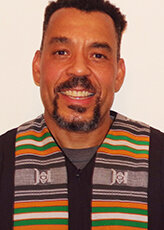
The
Philemon Project
“…no longer as a slave, but better than a slave, as a dear brother.”
Philemon 16, NIV
Introduction
The Philemon Project was a 10-week team-teaching and preaching series hosted by Intown Community Church in Atlanta, Georgia. Rooted in the New Testament book of Philemon, and branching out to consider related issues of how to interpret the Scriptures and apply them to our lives today, the series is focused on empowering God’s people to treasure the gospel by moving their relationships, and the structures of which they are a part, toward greater racial, social, and economic justice—all for the glory of Christ.
Why Philemon?
At 25 verses—one page in most modern Bibles—it would seem that one sermon could cover the teachings found in this part of Scripture. But there is great depth and complexity to the gospel challenges found in the book of Philemon that are worthy of our consideration.
• In Paul’s letter to Philemon, a Christian apostle challenges a Christian slave-holder (Philemon) to release from bondage an enslaved fellow-Christian (Onesimus) and to embrace him as an equal—a brother—because of their shared faith in Jesus. What, then, might this short letter have to say about how the gospel calls Christians to pursue social, economic, and racial justice in our own day?
• Yet, Paul does not seem to call for outright abolition of slavery in the Roman empire. To some, this has seemed like justification for slave-holding by Christians. Many American Christians took such an approach in the era before and after the Civil War. But many others, including our team members, believe such an approach is an abuse of this part of Scripture, not a legitimate use.
What evidence helps us in this kind of interpretive debate?
• To many in our day, the very existence of this epistle seems like a moral flaw in the Christian Scriptures, one more piece of evidence that Christianity is inherently immoral. If we don’t respond with integrity to this concern, the credibility of the gospel will be compromised in our generation and beyond. How can we answer?
• Common evangelical interpretations (more common among white Christians than non-white believers) sidestep the issues by arguing that first century slavery was a compassionate or just arrangement, that Philemon was a “servant” rather than a “slave,” or that Philemon and Onesimus were employer and employee. Such approaches are historically inaccurate, and they strike many as confirmation that Christians have no honest answer to the moral challenges raised by the text.
We must do better. Will we?
Teaching Team
Thurman Williams
Ordained in the Presbyterian Church in America (PCA), Thurman has extensive pastoral experience. He is the Director of Homiletics at Covenant Theological Seminary. Thurman is married to Evie, and they have four children between the ages of 18-24: Charvez, Shaquana, Joshua and Caleb.
Luke Bobo
An accomplished author and teacher on college and seminary faculties, Luke is Director of Strategic Partnerships for Made to Flourish, in Overland Park, Kansas. He is a Visiting Instructor in Contemporary Culture at Covenant Theological Seminary. Luke is married to Rita S. Holmes-Bobo, and they have two adult children, Briana Amber and Caleb Avery.
Steven Gilchrist
Originally from Oklahoma City, Steven currently serves as Church Planting Apprentice at Atlanta Westside Presbyterian Church in Atlanta, Georgia. A graduate of Reformed Theological Seminary in Atlanta, he is exploring a call to church planting, and has recently been approved as a church planting candidate in the PCA. He’s married and has twins.
Jimmy Agan
With experience teaching in seminaries and pastoring churches, Jimmy is Senior Pastor at Intown Community Church in Atlanta, a congregation of the PCA. Jimmy, Tricia, and their four adult children (Sarah Elizabeth, now married to Scott, Caroline, Patch, and Abby) came to Atlanta in 2015.
Our Opportunity
Now, more than ever, American Christians need to grapple honestly and deeply with this little letter of Philemon. We need to face head-on the challenges it raises. And we need to embrace the gospel transformation that can result if we will stand before this part of God’s word ready to believe its promises, to respond as it calls us to repentance, and to act on its vision for our lives. The events of 2020 revealed the desperate need. Let’s seize the opportunity to bring the gospel of Jesus Christ to bear on that need.
Resources
Video and audio files of Sermons and Seminars
A collection of imagery and artwork associated with The Philemon Project
How to talk to children about The Philemon Project - A video by Assistant Pastor Steve Yates and guest speaker Steven Gilchrist
Suggestions for further reading
Esau McCaulley, Reading While Black: African American Biblical Interpretation as an Exercise in Hope. IVP Academic, 2020. Purchase on Amazon
Aaron J. Layton, Dear White Christian: What Every White Christian Needs to Know About How Black Christians See, Think, and Experience Racism in America.Lawrenceville, GA: Committee on Discipleship Ministries, 2017. Purchase at PCA Bookstore
Luke Bobo, Race, Economics, and Apologetics: Is There a Connection? Self-published, 2019. Purchase on Amazon
Scot McKnight, The Letter to Philemon. New International Commentary on the New Testament. Grand Rapids, MI: Eerdmans, 2017. Purchase on Amazon




